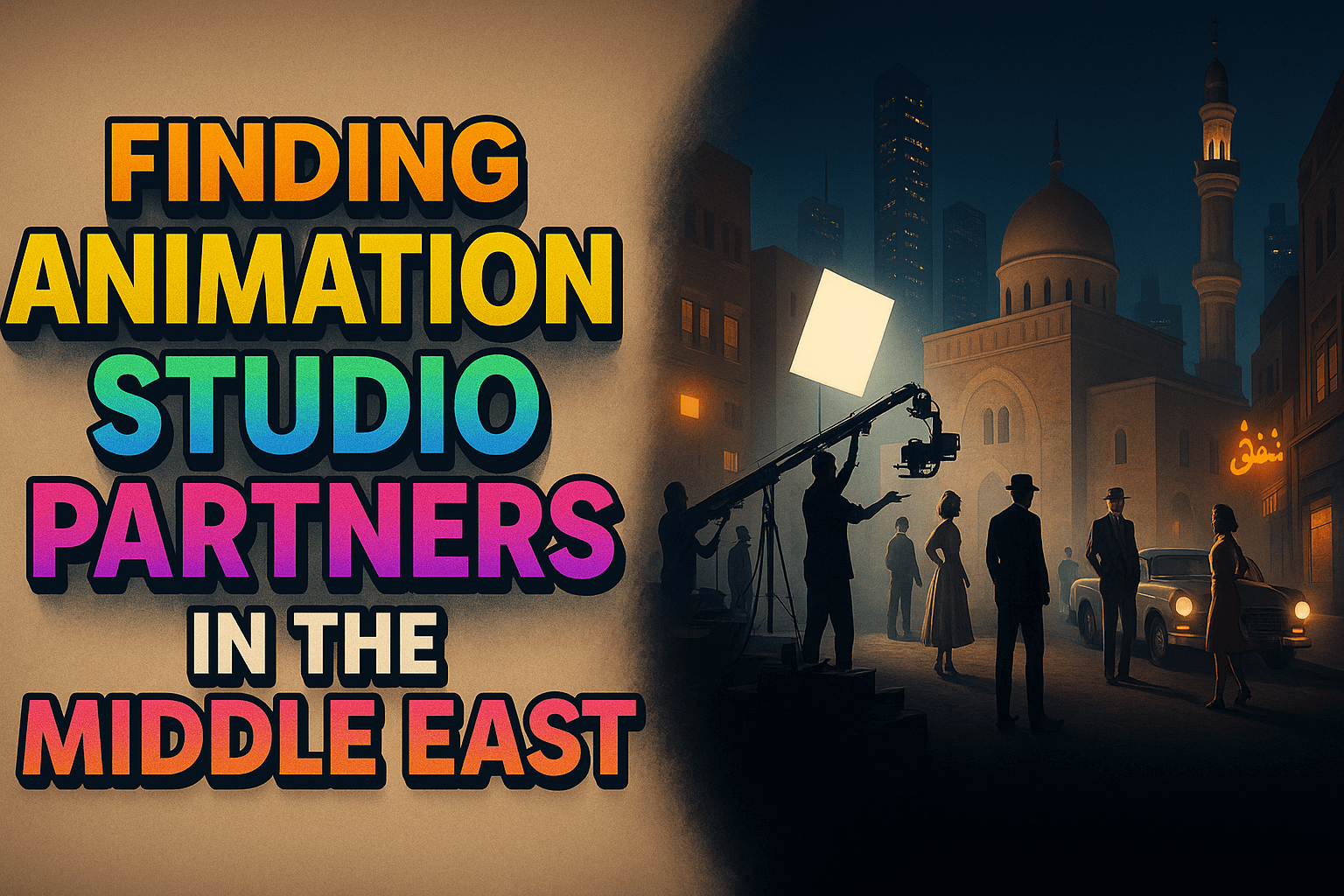The Executive’s Guide to Finding Animation Studio Partners in the Middle East

Introduction
The global animation landscape is undergoing a significant realignment, with new centers of creative and financial power emerging. For international producers and distributors, the Middle East has rapidly transformed from a high-value consumption market into a strategic hub for content creation.
This shift presents a substantial opportunity, but accessing it requires a new playbook. This executive guide moves beyond outdated assumptions and provides a data-driven framework for finding animation studio partners in the Middle East, ensuring your next co-production or service agreement is built on a foundation of verified intelligence, not speculation.
Table of content
- The Animation Boom: Why the Middle East is a Strategic Hub
- The Core Challenge: Navigating an Opaque Partnership Landscape
- A Data-Driven Framework for Finding Animation Studio Partners in the Middle East
- Key Hubs and Studios to Watch in the MENA Region
- How Vitrina Accelerates Your Partner Search in the Middle East
- Conclusion
- Frequently Asked Questions
Key Takeaways
| Core Challenge | Identifying and vetting qualified animation studios in the rapidly growing but opaque Middle East market is difficult due to a lack of centralized, reliable data on capabilities and track records. |
| Strategic Solution | Employing a data-driven framework to systematically map the ecosystem, evaluate partner credentials, and identify key decision-makers is essential for mitigating risk and securing the right partners. |
| Vitrina’s Role | Vitrina provides the verified, structured data platform needed to execute this framework, enabling executives to efficiently discover and qualify animation partners across the MENA region. |
The Animation Boom: Why the Middle East is a Strategic Hub
The narrative of the Middle East’s role in the global M&E industry is being rewritten. Fueled by ambitious national strategies like Saudi Arabia’s Vision 2030 and the UAE’s long-standing media development goals, the region is injecting unprecedented capital into its creative sectors.
A 2023 report highlighted that the Saudi Arabian animation, VFX, and gaming sectors are projected to be worth $6.5 billion by 2030, according to the country’s national gaming and esports strategy.
This is not merely investment in infrastructure; it is a concerted effort to cultivate local talent, develop original IP, and establish the region as a world-class production partner.
Key centers of activity have emerged, each with a distinct focus:
- Riyadh and Neom (Saudi Arabia): Representing the epicenter of new investment, with a focus on building a complete media ecosystem from the ground up, backed by entities like the Neom Media Hub.
- Abu Dhabi and Dubai (UAE): Leveraging their established status as international business hubs, with mature media free zones like twofour54 and Dubai Production City that offer logistical advantages and a deep pool of international talent.
For global executives, this translates into a compelling value proposition: access to fresh capital, a growing and increasingly skilled talent base, and attractive production incentives.
The opportunity is to engage with this burgeoning market not just as an endpoint for content distribution, but as a starting point for creative and financial partnership.
The Core Challenge: Navigating an Opaque Partnership Landscape
Despite the immense opportunity, the ground-level reality of sourcing partners in the region presents significant operational hurdles. Unlike established markets in North America or Europe, the MENA M&E ecosystem lacks the centralized directories and transparent track records that executives rely on for due diligence.
The primary challenges in finding animation studio partners in the Middle East include:
- Lack of Verified Data: Simple web searches yield a mix of promotional websites and out-of-date lists. It is exceedingly difficult to find objective, verified information on a studio’s true capabilities, key personnel, past projects, and client history.
- Difficulty in Assessing Quality: A polished showreel can be misleading. Without access to detailed project credits and a clear understanding of a studio’s specific contribution to past projects, it is nearly impossible to accurately assess their quality and reliability from afar.
- Opaque Networks: Identifying the actual decision-makers—the Head of Production or CEO, rather than a generic contact email—is a major bottleneck. The region’s business culture is heavily relationship-driven, making cold outreach based on incomplete information highly ineffective.
- Rapid Change: The market is evolving so quickly that new studios are launching and existing ones are scaling at a pace that public information sources cannot track. What was true six months ago may not be true today.
These factors combine to make the partner discovery process slow, risky, and resource-intensive, often forcing companies to rely on a limited number of known players rather than exploring the full breadth of available talent.
A Data-Driven Framework for Finding Animation Studio Partners in the Middle East
To overcome these challenges, a systematic, data-driven approach is required. This framework breaks the process down into four distinct, actionable stages that move from high-level strategy to direct, informed engagement.
Step 1: Define Your Strategic Needs and Partner Profile
Before beginning your search, define your requirements with absolute clarity. “Animation services” is too broad. Are you looking for a full co-production partner to develop IP, or a service studio for a specific task like 3D modeling or character rigging? Detail your specific needs:
- Creative Style: 2D, 3D, stop-motion, anime-inspired, etc.
- Technical Pipeline: What software and workflows are required?
- Scale and Capacity: What is the scope of your project (e.g., number of episodes, minutes of animation) and what size of team is needed?
- Budget and Timeline: What are your financial and delivery constraints?
Step 2: Map the Ecosystem Using Structured Data
This is the most critical stage. Move beyond search engines and use a professional market intelligence platform. The goal is to filter the entire universe of potential partners down to a qualified longlist. Use a tool that allows you to search the MENA animation industry and filter by granular criteria such as:
- Country of Operation: (e.g., UAE, Saudi Arabia, Egypt, Jordan)
- Specialization: (e.g., 3D Animation, Motion Graphics, Visual Effects)
- Company Size: To match the scale of your project.
Step 3: Evaluate Capabilities and Track Records
With a longlist of potential studios, the vetting process begins. Focus on objective evidence of past performance. A studio’s official client list is a starting point, but you need to dig deeper by analyzing their detailed credits. Ask critical questions:
- Who were their partners on major projects? Were they working with international studios, global streamers, or primarily local broadcasters?
- What was their specific role? Were they the lead animation studio or one of several vendors?
- Do they have experience with the genre and scale of your project?
Step 4: Identify and Engage Key Decision-Makers
Once you have a shortlist of 3-5 highly qualified studios, the final step is to connect with the right people. An effective intelligence platform will provide verified contact details for key executives, allowing you to bypass gatekeepers and initiate a peer-to-peer conversation. A personalized message to the Head of Production that references their specific, relevant past work is exponentially more effective than a generic inquiry.
Key Hubs and Studios to Watch in the MENA Region
While a data-driven search will uncover many partners, understanding the major hubs provides essential context.
- Saudi Arabia (Riyadh & Neom): The Kingdom is the region’s most ambitious player. Manga Productions, a subsidiary of the Crown Prince’s MiSK Foundation, is a prime example of this ambition, developing projects that aim for both local and global audiences. The massive investment in Neom as a futuristic media hub signals a long-term commitment to becoming a global production destination.
- United Arab Emirates (Abu Dhabi & Dubai): The UAE offers a stable, mature infrastructure for international productions. Abu Dhabi’s twofour54 media zone provides generous incentives, including a 30% cash rebate, and has attracted numerous international projects. Dubai’s ecosystem, including Dubai Production City and Dubai Studio City, hosts a diverse range of local and international service companies with extensive experience.
Understanding these centers helps contextualize your search and tailor your engagement strategy to the unique strengths of each market.
How Vitrina Accelerates Your Partner Search in the Middle East
The strategic framework outlined above is only as effective as the data that powers it. Vitrina is the market intelligence platform designed to provide the specific, verified, and structured data required to execute this process with speed and confidence.
Our platform allows you to move beyond speculation and conduct a surgical search for partners. You can instantly filter thousands of companies to identify animation studios in Saudi Arabia or the UAE, review their complete, verified project histories, and access the contact information of their key decision-makers.
Instead of spending weeks on manual research with uncertain results, Vitrina enables you to build a qualified shortlist of potential partners in a matter of hours.
By providing a transparent, 360-degree view of the M&E supply chain, we offer the critical solutions needed to de-risk your entry into the Middle East and connect with the right creative partners to bring your project to life.
Conclusion: From Speculation to Strategic Partnership
The opportunity within the Middle East’s animation sector is undeniable and growing daily. However, the complexity and opacity of the market mean that a traditional, relationship-based approach to partner discovery is no longer sufficient. Success in this new environment demands a strategic shift towards a data-driven methodology.
By systematically defining needs, mapping the landscape with verified data, evaluating capabilities based on concrete evidence, and engaging directly with decision-makers, international executives can navigate the market with confidence.
Finding animation studio partners in the Middle East ceases to be a game of chance and becomes a repeatable, strategic process.
The companies that adopt this modern approach will be the ones to forge the most successful and enduring partnerships in this dynamic and vital creative region.
Frequently Asked Questions
Saudi Arabia and the United Arab Emirates (UAE) are the two leading hubs. Saudi Arabia is experiencing explosive growth fueled by massive government investment, particularly around Riyadh and Neom. The UAE, with established media zones like Abu Dhabi’s twofour54 and Dubai Production City, offers mature infrastructure and attractive incentives.
The animation industry in Saudi Arabia is a core pillar of its Vision 2030 plan. Growth is driven by significant government funding, the establishment of studios like Manga Productions, and massive investments in media infrastructure like the Neom Media Hub, all aimed at developing local talent and producing content for global audiences.
The UAE is home to a mix of established and emerging animation studios located primarily in Dubai and Abu Dhabi. While a definitive “major” list changes, the ecosystem includes numerous service studios that have worked on international projects, benefiting from the infrastructure and incentives provided by media zones like twofour54.
Many Middle Eastern countries are actively encouraging international co-productions through government incentives, rebates, and bilateral agreements. While formal treaty networks are still developing compared to Europe, entities like the Saudi Film Commission and Abu Dhabi Film Commission offer robust support and financial incentives for qualifying international co-production projects.

























